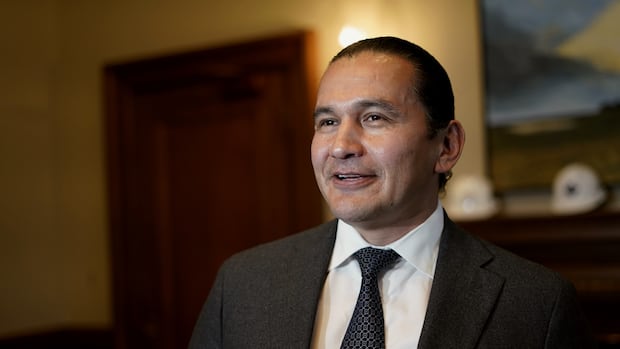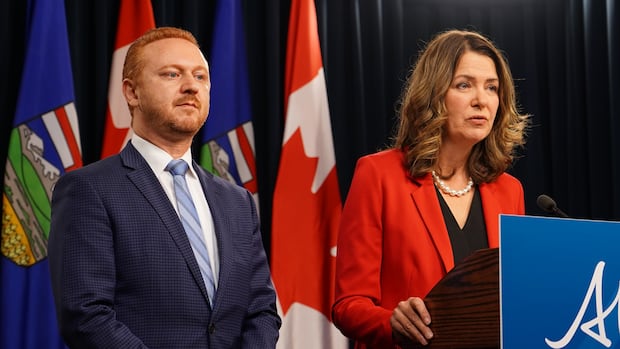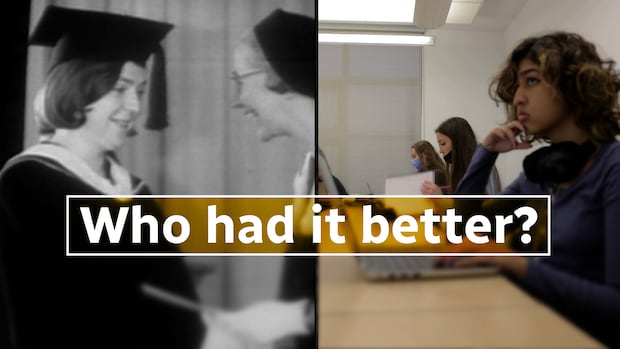The Alberta government has tabled legislation that seeks to invoke the notwithstanding clause to shield a suite of bills from legal challenges that affects transgender youth and adults.
Premier Danielle Smith said at a news conference on Monday that three ongoing legal challenges to gender policies in health care and education could take years to resolve and create too much uncertainty.
“This government does not turn to the notwithstanding clause unless the stakes warrant it, and in this case, the stakes could not be higher,” she said Monday, before the bill was introduced Tuesday.
“This is one of the most consequential actions our government will take during our time in office.”
Bennett Jensen, director of legal at the 2SLGBTQ+ advocacy group Egale Canada, which is challenging two pieces of legislation, called the Alberta government's moves cynical and chilling.
"The government seems to be on a path of replicating the worst of the United States in terms of attacks on minority populations, in terms of calling into question the rule of law and in terms of not respecting evidence or science," he said. "I hope that the rest of the country looks at that in horror and turns the other direction."
In question are three pieces of legislation the United Conservative Party government introduced last year that government officials say protect the well-being of children and youth and increase parent access to information and decision-making power over children.
Critics have panned the legislation as violations of rights based on misinformation that unfairly target transgender youth and adults, as well as women and girls in competitive sports.
Bill 26, passed by the legislature last year, prevents youth under 16 from accessing gender-affirming treatments, including puberty blockers and hormone therapy. It also prohibits gender surgery for minors. The legislation was a Canadian first.
The Canadian Medical Association (CMA), Egale and the Skipping Stone Foundation challenged the law in court.
In June, a judge granted an injunction pausing the law’s implementation, saying the new rules could be harmful if enacted before the court heard all evidence.
In a statement Tuesday, CMA president Dr. Margot Burnell said the province is both restricting access to gender-affirming care and infringing on doctors' freedom of conscience.
"Canadians don't want politicians making medical decisions for them," her statement said.
". . . This kind of political intrusion into evidence-based care is unacceptable and risks setting a precedent that affects other national health issues, such as vaccination or reproductive health."
Egale and Skipping Stone are also challenging legislation formerly known as Bill 27, which imposed new requirements on how school staff handle gender identity issues.
Staff must tell the parents or guardians of any students under 18 who wish to be addressed by a name or pronoun of a different gender identity. Parents of students under 16 must give permission for school staff to use the student’s chosen name and pronouns.
The bill also made Alberta the first province where parents must opt students into lessons about sexual health, gender identity or sexual orientation.
WATCH | It's the 2nd time in under a month that Alberta has invoked the clause:The Alberta government is invoking the notwithstanding clause for the second time in three weeks, this time to block court challenges against laws introduced last year affecting transgender youth.The education minister must approve all resources and classroom presenters for lessons on sexual health, gender identity or sexual orientation.
A third bill, the Fairness and Safety in Sport Act, requires anyone participating in female-only competitive sports in Alberta to have been assigned female at birth. Some organizations, including school boards, have adopted policies that allow people to anonymously challenge the gender identity of athletes.
In a statement Tuesday, the Ministry of Tourism and Sport said any organization hosting national or international competitive events must comply with the law to qualify for Alberta Major Sport Event grants.
In an emailed statement last week, a spokesperson for Egale said the organization had not launched a legal challenge against the sports bill but was committed to opposing the law.
'This is needed now,' minister saysJustice Minister Mickey Amery said Monday that as evidence and policy around the best standards of care for trans youth evolves around the world, his government is attempting to use the notwithstanding clause to “err on the side of caution” by limiting access to puberty blockers, hormones and surgery.
Although the premier defended the moves by saying children deserve to have their fertility preserved until they are mature enough to make potentially life-changing decisions, medical experts say taking puberty blockers alone should not affect a person’s fertility in the long term.
In response to reporters’ questions about why it was urgent to shield the school and sports laws from court challenges, Amery said the government doesn’t want to come back to the legislature to invoke the notwithstanding clause multiple times.
“This is needed now. It's needed to be a sweeping motion that addresses all three of these acts,” he said.
If passed, the Protecting Alberta’s Children Statutes Amendment Act, also called Bill 9, would shield the laws from Charter challenges for five years.
It would also suspend the application of the Alberta Bill of Rights and the Alberta Human Rights Act to the laws in perpetuity.
Amery said once the bill is passed, courts can’t strike down laws to which the notwithstanding clause applies. He said proclaiming Bill 9 should terminate all court actions against the bills.
Jensen said that is a "bold claim" by the minister, and that the Alberta government will have to convince courts that ongoing proceedings shouldn't continue. However, he said the injunction on the health bill could be null once the bill passes, because it would then apply to an outdated piece of legislation.
Jensen said although the organizations challenging the bill need time to analyze their next moves, Egale is not done fighting the legislation.
"That's the most important thing for Albertans to know at this moment, that we're still here, and we're still fighting even on this dark day."
Prof says laws causing student harm, teacher discomfortIt is the second time in three weeks that the Alberta government has turned to the notwithstanding clause to prevent a court from overturning its laws.
On Oct. 27, the government tabled and passed the Back to School Act in one sitting day, which forced 51,000 locked-out teachers back to work, imposed a four-year contract on them, and used the clause to limit court challenges.
The Alberta Teachers’ Association (ATA) launched a court challenge of that bill, regardless of the clause.
In a statement Tuesday, ATA president Jason Schilling said he believes the government's use of the notwithstanding clause three more times is a flagrant abuse of power and dangerous practice.
He said the ATA is against any requirement to disclose sensitive information about a student's identity.
Gillian Robinson, an assistant professor of education at the University of Alberta's Faculté Saint-Jean, has been researching the effects of the education and sports bills on Alberta teachers, as well as a government order to limit student access to graphic materials.
"Teachers felt that this was a kind of a multi-pronged attack from the government on the profession of teaching and on the creation of safe and inclusive spaces in schools," Robinson said.
Thirty teachers interviewed, who worked in small and large communities across Alberta, felt "grossly uncomfortable" asking young girls about their gender assignment at birth, and being told to misgender students, Robinson said.
She added that teachers reported that the bills caused fear in students, and that fewer are attending gay-straight alliance meetings or asking to be addressed by a different name or pronoun. Educators worried if they could have a picture of a same-sex partner on their desk or a Pride flag in their classroom, she added.
"I'm so frustrated, because the government is ... purposely misusing the language of protecting children, when we know that this actually will not protect children, and will harm children," Robinson said.
John Hilton-O'Brien, executive director of the group Parents for Choice in Education, said he sees the move differently. The organization was in favour of the three bills because they gave parents more agency and information about their children from teachers and health-care providers, he said.
"The government is saying the quiet part out loud," Hilton-O'Brien said. "They don't think that any law dealing with parental authority, youth sport or child health will ever survive a wave of Charter litigation coming from federally funded activist groups, and even large public-sector unions."
He said he's pleased the government is standing behind the laws it passed. Whether they have made parents feel better informed or included remains to be seen, he said.
Hilton-O'Brien said he sees the use of the notwithstanding clause as a symptom of a larger problem, which is a disconnect between courts and the politicians the public elects.
"If every contentious law needs the notwithstanding clause to function, something in our constitutional machinery is breaking down," he said.











